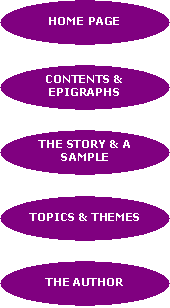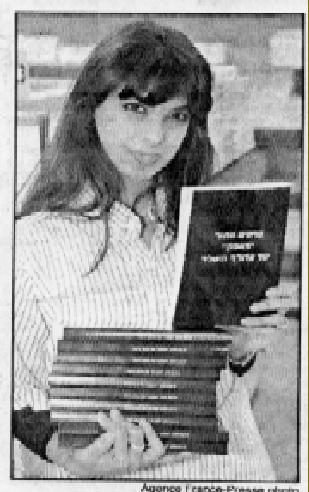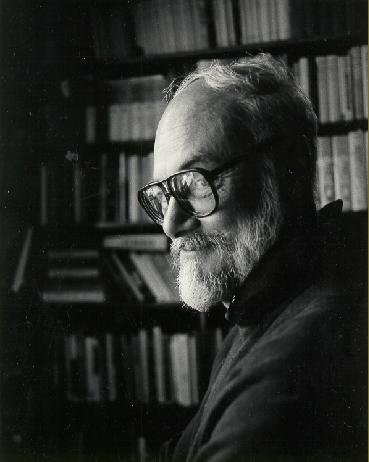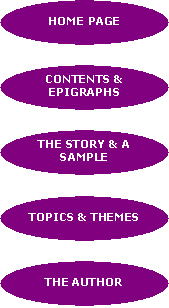


|
THE AUTHOR |

|
R(ichard) F(arr) Dietrich grew up in Port Clinton, Ohio, and attended school at Miami University of Ohio and Bowling Green State University After getting his Ph.D. at Florida State University, he taught at the University of Delaware and then at the University of South Florida. He's published widely in modern literature and modern drama. The principal inspiration for The Final Solution came from his teaching of a course in "The Apocalypse in Modern Literature & Film," which taught him many of the truths about the apocalyptic tradition that he embodies in the fictional world of this novel. The Final Solution reflects his realization that religion from Zoroaster to Billy Graham has featured an apocalyptic "Final Solution," a concept given a very ugly twist by Adolph Hitler but true to the meat-cleaver, judgmental spirit of the tradition, in which the "impure" are always surgically removed from the "pure" and "dealt with." The novel follows from the further realization that while the apocalyptic "End of Days" previously had been wishful thinking, Hitler's Nazis revealed that a purely man-made apocalypse would someday be technologically possible. With weapons of mass destruction becoming increasingly available, the Apocalypse needs only a handful of True Believers to pull it off. In fact, with the rise of religious intolerance in the world, a Holocaust of Humanity is now growing increasingly likely, waiting only for just the right Beast of the Apocalypse to cue The End. The Final Solution is the tale of the "slouching toward Bethlehem" to be born of exactly that rough beast and Wolf Berlin's desperate attempt to forestall him, a struggle thrown into doubt by the fact that this beast is an old soul-mate of his, who offers Wolf the roles of Peter and Paul in his post-Apocalypse religion. Or so Wolf tells us. |
|
THE NOVEL AS AUTOBIOGRAPHY? |
|
One sure way to drive a writer nuts is to insist that his stories are all about him, that they are just thinly disguised autobiography. Perhaps the principal thing that drives him nuts is that there's just enough truth in that to give the writer pause in his angry reply. Of course a writer can't write, successfully, about something he knows nothing about or whose emotions he hasn't felt himself. And so there are many instances in The Final Solution of my borrowing from personal experience. For example, I actually witnessed the vicious hazing of a young Jew by frat men who are rather like the frat men described in my novel, and my repulsion clearly finds its way into this novel. But the young Jew hazed was not much like the Harry Zaddik of my novel, and I know nothing of what happened to him after we both left that school. So, too, there are similarities between myself and Wolf Berlin, the novel's protagonist, but there are many more dissimilarities, which is why the narration often shows him in an ironic light, even to the point of questioning whether the secularism he and I share has failed. And the similarities between us were used mostly for the sake of getting more reality into Wolf's portrayal--such as his jocking around and the muscle cramps he experienced. I also admit to using Wolf to float some ideas that I would like to have considered, such as the internationalization of Jerusalem as the only way to make peace in the Middle East, but I took care to make his speaking of them part of his characterization. Perhaps it's the rule with writers, in constructing their protagonists, to take some aspect of themselves or some possibility that was never realized and embody that in the central character, and then let the character find his way through events that the author never experienced first hand or do things that the author would never do. "What would happen if…." writers always ask, and it's that "if" that launches the author into the world of the imagination, where no "real life experience" is allowed in unless it consents to radical transmutation. Yes, I used models, but my characters aren't based solely on particular people, rather they're amalgams of numerous people, with some figments added, that went through the fiery furnace of the imagination before coming out as wholes. To illustrate, I'll show you one of the young women who sat for the portrait of Jez Cohen. The photo below appeared in the local newspaper one day and spoke to me of the brave contradictions I was conjuring up in the character of Jez Cohen. The Israeli girl in the photo suggested a Jez who boldly went perhaps where no Jewish girl had gone before. And then I remembered I had actually met a young Jewish girl, many years ago, who had already gone there, and she filled in most of the rest of the portrait of Jez, although two or three other women pitched in as well: |

|
'MEIN KAMPF' IN HERBREW An Israeli woman displays the first translation into Hebrew of Adolf Hitler's "Mein Kampf" at the Hebrew University of Jerusalem bookstore on Wednesday. The book, which Hitler began writing in 1923 while serving a prison sentence for his role in a failed coup, details his anti-Semitic philosophy and strategy for world control. (2/16/95-The Tampa Tribune) |

|
|

|
R. F. Dietrich, Author of THE FINAL SOLUTION |
|
This novel can be ordered from Barnes & Noble, Borders, and other book stores, or off the Web at www.bn.com, www.amazon.com, www.addall.com. Or call iUniverse at 1-877-823-9235. Search under ISBN 0595132731 |

|
READ A SAMPLE OF THE NOVEL |
|
To read Chapter 1 of The Final Solution, click here. |
